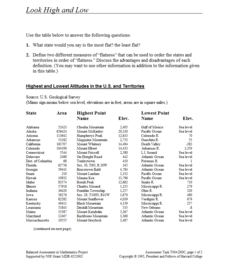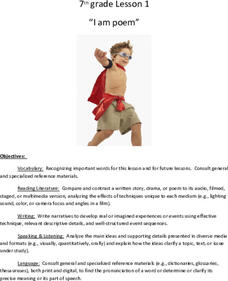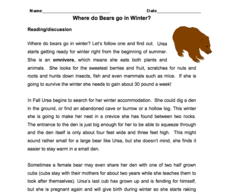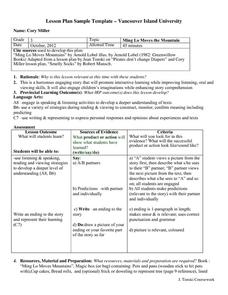Goodwill Community Foundation, Inc.
Saying Goodbye
It's really fun to learn Spanish, but the conversation has to end sometime. An interactive learning resource teaches pupils how to say goodbye in several different ways, including ¡chao! and ¡hasta pronto!
Goodwill Community Foundation, Inc.
Manners and Etiquette
Learning how to speak Spanish is incomplete if you're not speaking politely! Teach class members the basics of Spanish manners, including perdón, lo siento, and salud to reinforce their conversational etiquette.
University of North Carolina
Qualifiers
A lot of writers really struggle very much with adding a lot of qualifiers and intensifiers in their writing. Part of a larger series to improve writing skills, a handout on the topic provides tips to help reduce a reliance on these...
College of the Canyons
Free Verse
Free verse poetry is often regarded as poetry without structure, but in reality, it is a poetic form that adheres to its own poet's thought and breath patterns. Delve into the rules and famous examples of free-verse poetry with a short...
PBS
Myth of the West: Kit Carson to the Rescue
There's nothing like the Wild Wild West! Scholars investigate the American Frontier through the eyes of Kit Carson. To complete the first installment of a three-part series, they use presentations, a short video, and primary and...
University of North Carolina
Music
Music is a universal pleasure, but writing about it can be a little trickier. An informative handout discusses common types of music writing assignments that one might encounter in a college-level course. Individuals read about musical...
Concord Consortium
Look High and Low
From the highest high to the lowest low here's a resource that won't fall flat. Given data on the area and the highest and lowest elevations of each of the 50 states, learners decide which states are the least flat and the most flat. Of...
Serendip
Molecular Biology Vocabulary Review Game
Getting bored with the typical review strategies? Why not turn it into a game! Learners practice their DNA vocabulary by trying to get their partner to guess the word they're describing. To complicate things a bit, there are words that...
Serendip
Genetics Vocabulary Review Game
Taboo, anyone?! A vocabulary review lesson asks learners to give their partners clues to help them guess the target word. The catch? There are words that are taboo. If they use the prohibited words, they don't get credit if partners...
Serendip
Mitosis, Meiosis and Fertilization Vocabulary Review Taboo Game
Can you describe a gamete without using the words sperm or egg? Scholars play a vocabulary review game where they try to get other players to guess their words. Each card has the target word as well as two related words they must not...
Wisconsin Family Assistance Center for Education
Sight Word Lists and Activities
Scholars examine newspaper articles and highlight two sight words to discover which appears more frequently. They then glue sight words onto paper to make flashcards before composing, writing, and creating picture representations of...
College Board
Evaluating Sources: How Credible Are They?
How can learners evaluate research sources for authority, accuracy, and credibility? By completing readings, discussions, and graphic organizers, scholars learn how to properly evaluate sources to find credible information. Additionally,...
Utah Education Network (UEN)
7th Grade Poetry: I Am Poem
A study of Alfred Noyes's poem "The Highwayman" opens a lesson about narrative poetry. Scholars read the poem and compare it to the animated video version using a worksheet. Learners look at models and use a template to craft an "I Am"...
Curated OER
Teaching With Documents Lesson Plan: "A Date Which Will Live in Infamy"
Your class examines F.D.R.'s speech for examples of repetition, alliteration, emotionally charged words, etc. They listen to the speech and interview a person who heard it delivered. They finish by writing an article about the experience.
K12 Reader
Have You Got the Time?
Time and time measurement is the subject of a comprehension learning exercise that asks kids to read a short passage about time, and then respond to a series of questions based on the article.
Media Smarts
Thinking About Television and Movies
As part of their study of the influence of TV and films, class members consider how music, lighting, costumes, camera angles, etc. are used to influence the response of viewers.
Curated OER
Challenge your 4th-8th grade kids with the Math Olympiads
Discover this great program for challenging and training advanced math learners.
Curated OER
Homophone Hunt
What is a homophone? Review the definition with your class before sending them off for this independent activity. As they read the story, they search for any homophones used incorrectly.
Worksheet Web
Where do Bears go in Winter?
Do bears really sleep for an entire season? Six multiple choice questions and a drawing activity make up a worksheet that tests scholars' comprehension skills after reading about bears during winter.
Krzysztof Haft-Szatynski
Move the Turtle
Turtles are not known to be speedy movers, but have you ever tried to get them to move in a specific direction? How about getting them to move in a perfect circle? With this app, young computer programmers have to be on their toes to...
Glacier Peak High School
Huckleberry Finn Theme Project Ideas
Looking for a project list to conclude a study of The Adventures of Huckleberry Finn? The six suggestions included in the menu (a song, thematic box, CD case, book jacket, blog, scene) could be assigned to individuals or groups....
Vancouver Island University
Ming Lo Moves the Mountain
A good story is a great way to support skills that are necessary for encouraging strong reading skills. Here is a class I do, You do, We do style lesson that stars the tale, Ming Lo Moves the Mountain. Included are two fun pre-reading...
Mrs. Warner's Learning Community
Their There They’re
There's a great way for your learners to practice their homophones, and they won't even realize they're studying! A baseball-themed worksheet prompts your class to fill in there, they're, or their in the appropriate spaces.
K12 Reader
The Important Apostrophe: Their, They’re, and There
They're going to be there with their family. Class members practice using and identifying the correct use of they're, there, and their with a skills practice instructional activity. The top half of the instructional activity gives brief...























